Insider Briefing of 27 February, 2020
Helping You Thrive in the World's ONLY Vital, Scarce and Recession-Proof Market
In this week's Insider Briefing CEO Eckelberry covers how the coronavirus is impacting the global business world, and how this relates to already existing prevalent trends in numerous marketplaces. Find out in this briefing how this all relates to the steadily rising trend in point-of-use, self-reliant water treatment and end-user water autonomy.
Transcript from recording:
Introduction
Riggs: Hello everyone. It is the 27th of February. By the way, it's a leap year, will be the 29th this year. It's a pleasure to have you on board. Lots to talk about so I'm going to cover this. I really like these audio briefings because they are very intimate and I get to talk to you intimately so let's get on with it.
The Big News
The big news is obviously Coronavirus. That is huge and what I'm seeing happen is that companies are now reacting by halting operations and restricting employee travel to China. This is true of a whole bunch of businesses. We've got Facebook, which even though it's forbidden in China, actually has a lot of offices there, LG, Nestle, L'Oreal, Cargill are discouraging travel. I see that Nestle, the world's largest food company, has asked all 291,000 of its employees not to travel until the middle of March. “Domestic travel should be replaced by alternative methods of communication where possible.”
And Unilever also. Between them Nestle, L'Oreal and Unilever employ about 532,000 people worldwide and the list goes on. Of course, the airlines are in deep trouble because of this. Although some are operating fine. Ryanair is operating normally so it's interesting what's happening there, but in general there's a pullback by the large corporations. Basically, don't travel because one of the issues is you might travel and go somewhere and when you come back, you'll be quarantined. That's the danger right. Now what does this mean? I looked today, we're on the Zoom platform right now, and guess what? Zoom stock price three weeks ago was at $87, now it's at $113. It has taken off like crazy.
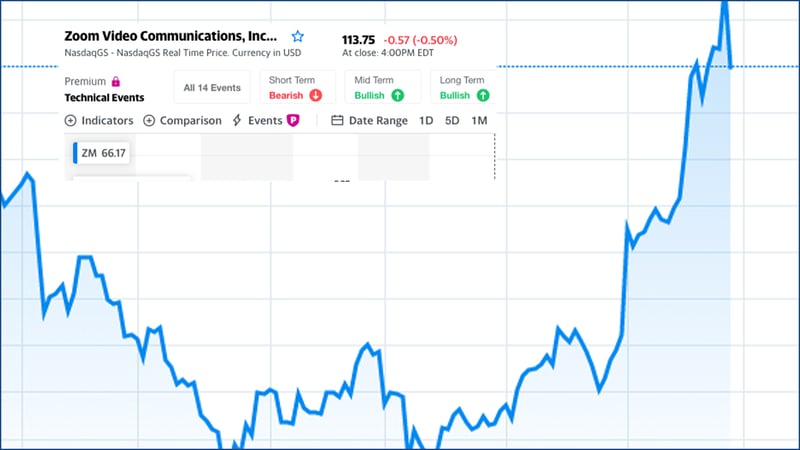 “Zoom stock price three weeks ago was at $87, now it's at $113. It has taken off like crazy.”
“Zoom stock price three weeks ago was at $87, now it's at $113. It has taken off like crazy.”
We have also the stock market. This is in the New York times, “Coronavirus drives stocks down for sixth day and into a correction.” I think frankly, that the stock market is slow to react to this because we could see where this was going some time ago. What does this mean? Let's just widen our scope a little bit. Today I went to Sam's Club because I had to, I needed something today so I physically went to Sam's club. I should've gone online, but I had to get it today. And I thought, “My gosh, there are not going to be a lot of people showing up at these stores when they can do it online.”
Similarly restaurants, you'll eat at home more and more. Theaters, hotels, the list goes on, conferences, conventions, these are businesses that are just going to wither on the vine. They're skiing the world cup right now with no spectators, they've banned spectators! Anywhere you think of people getting together, there's going to be a pullback.
Existing Trends Are Reinforced
But here's the thing. This only reinforces an existing trend. Zoom was already on a roll. Its stock was already doing great. It was a buck a couple months ago. These are existing trends. The trend to online marketing, I already was not buying from places like Sam's Club physically. I was buying from them online already. Existing trends are reinforced and that's really the key.
The Trend In Water
Let's talk about existing trends because the other big piece of news here is, I'm seeing all these headlines. “Fort Lauderdale updates residents on the sewer main break at the George English park.” Then we have another one where the Pennsylvania man cancels plans to retire in Fort Lauderdale, why? The sewer pipe crisis; we have horrendous quality of sewage.
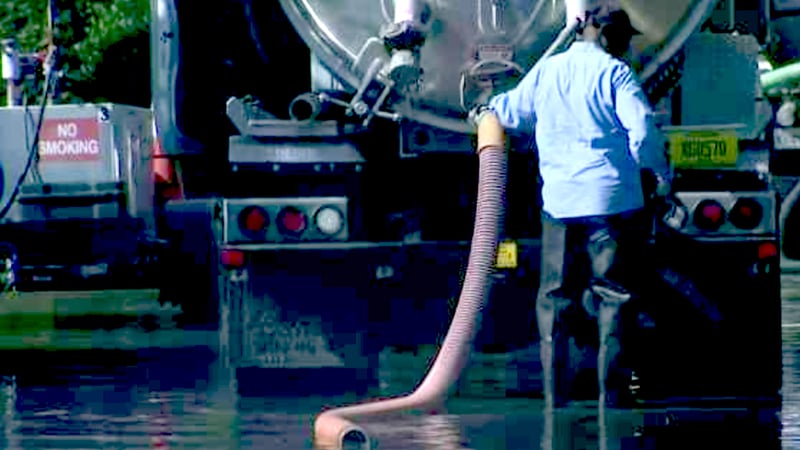 Fort Lauderdale Updates Residents On George English Park Sewer Main Break (CBS Miami. FEBRUARY 27, 2020)
Fort Lauderdale Updates Residents On George English Park Sewer Main Break (CBS Miami. FEBRUARY 27, 2020)
This story that I read about in Lowndes County, Alabama. The same place where that trailer park is that we’re saving. They have puddles of sewage in the backyard with human feces. “Thousands of the county's residents are in the same situation. Local government won't pay to build infrastructure to connect them to proper wastewater disposal lines so they'll have to deal with the myriad problems caused by living in sewage that bubbles up into showers and bathtubs.”
“34% of participants in this study of county residents in 2017 suffered from hookworm, a parasitic infection contracted by walking barefoot on soil contaminated by fecal matter. This causes slow development in children. Among other things, lack of sanitation according to one person there…” It says it accounts for a variety of problems in the county. You get the story.
And The Big Projects?
Meanwhile the big projects, for example, San Diego's landmark water recycling project, it's not happening. Why? Because there are big union problems. So that's ground to a halt. Big projects in this day and age just don't happen. Why? Because you've got an already developed landscape and very high labor costs. And finally, you have NIMBY, not in my backyard. Go ahead and try and locate a sewage plant anywhere near where people live.
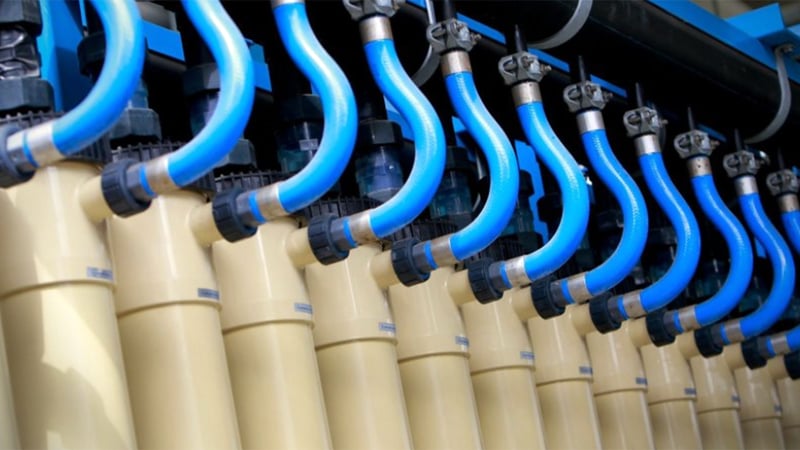 San Diego’s landmark water recycling project may face longer delays than expected (The San Diego Union Tribune. FEBRUARY 23, 2020
San Diego’s landmark water recycling project may face longer delays than expected (The San Diego Union Tribune. FEBRUARY 23, 2020
Johnny Depp has done an amazing film about toxic waste. “Places so toxic they threatened any life that enters them. Some are as small as a few hundred square meters, others spread over hundreds of kilometers. All are manmade, most the result of industrial pollution and they're growing.” That is a show called Minamata and it stars Johnny Depp. You get the general story and that is that things are falling apart in sewage.
 Johnny Depp film highlights toxic waste and the poisoned chalice of progress (Daily Maverick: Our Burning Planet. FEBRUARY 20, 2020)
Johnny Depp film highlights toxic waste and the poisoned chalice of progress (Daily Maverick: Our Burning Planet. FEBRUARY 20, 2020)
Remember at the beginning of this talk I was talking about the coronavirus. It’s just accentuating a trend that is already occurring. Trends away from eating out, trends away from meeting in large conferences together, trends away from traveling to China just to have a meeting, right? These were already becoming lesser and lesser. The only reason it was still happening was because heck, just bite the bullet and fly for 20 hours.
Trend Toward Water Autonomy
But now there's a real reason to do the online thing and to use Zoom as we are. Reinforcing existing trends. That is what you got to remember about what's happening right now. That's where we come in because what we're seeing here is all these failures of central sewage treatment, central operations. Last week I showed you a graph. If you want to go on to https://www.originclear.com/ceo/the-new-insider-briefing you'll see the graph that I was talking about where operation and maintenance is a cost that's been rising since 1960. It's now seven times what it was back then. Why? Because no one's investing in these central plants and they cannot. What is the trend? The trend is towards autonomous water treatment and now it's going to be accentuated.
Why? Because as I told you, what's already happening is going to get worse. Do you think that capital is going to become available for all these big things when there's going to be all kinds of money being thrown at keeping people going, in this tough time? Things are going to be aggravated and we see two things: Maintenance is going to increase and also autonomous water treatment, Water Autonnomy™.
As things fall apart at the center, you've still got people at the edge that have to take care of their water. They’ve got to do something. In fact, if they take care of their water then they can reuse it and also get some free water. As the center falls apart, then you've got the edge that starts to grow. This is a trend I've been talking about since 2016. It is why we invested in Modular Water Systems™ product line and its patents in 2018. I'm going to tell you about what just happened with Modular Water.
Modular Water’s Emerging Materials
I've got an email here from Dan Early, our guru. I am not going to name names, but he says here, “I just hung up on the phone after speaking with a certain water company and this water company was following up on a mandate from this particular city in the Mid-Atlantic region that has instructed their consultant to start working on budgeting and design for a packaged pump station using our structural reinforced thermoplastic, SRTP material.”
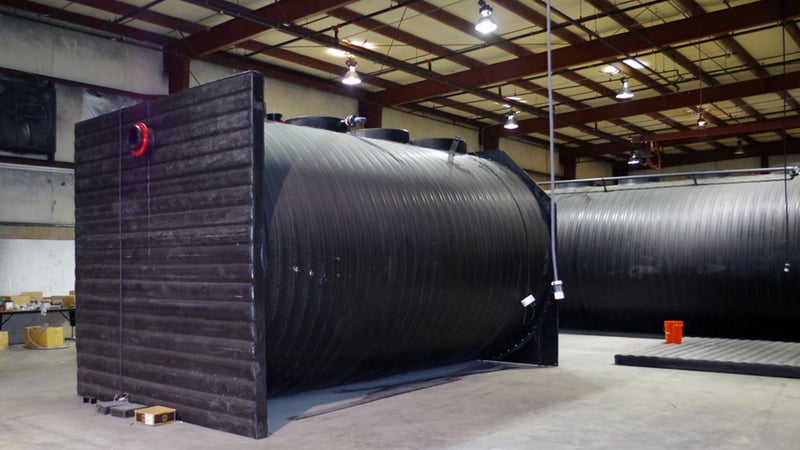 Modular Water Systems™ Structurally Reinforced Thermoplastic systems (SRTP) are built with non-corrosive reinforced plastics with a lifespan as great as 100 years. Pictured: a Dan Early design using SRTP.
Modular Water Systems™ Structurally Reinforced Thermoplastic systems (SRTP) are built with non-corrosive reinforced plastics with a lifespan as great as 100 years. Pictured: a Dan Early design using SRTP.
“The city will no longer use any concrete structures for their pump stations, too expensive to maintain and replace every 20 years. The city was aware of what we do and instructed their consultant to start work in that direction. The consultant called the water company, which called us. The key message is that the city is going to adopt this SRTP standard moving forward. This is a huge deal because once the first locality does this, the rest of the Mid-Atlantic region, will follow suit.” Then, as Dan says, “It spreads from there to other regions.”
Now here's what is interesting. We have an amazing angle with our systems. Mike Mann, who is just an amazing commercial salesperson, is wearing three hats.
He is helping to sell these systems and it literally looks like he's bringing in a deal that's collectively worth over $1 million. No guarantees, but he is the guy and for this client, and it seems to be happening. He submitted a bid that was saving 2,000 to $3,000 over a concrete system, which also saves them almost two weeks of install time.
Pump Stations & Lift Stations: The Difference
Now here's the deal. If we are able to price below concrete and we go from a two week install to about a two hour install and we still get margins that are 25 to 27 maybe 30%, how can we lose? The difference between pump stations versus lift stations is important. What's a pump station? What's a lift station?
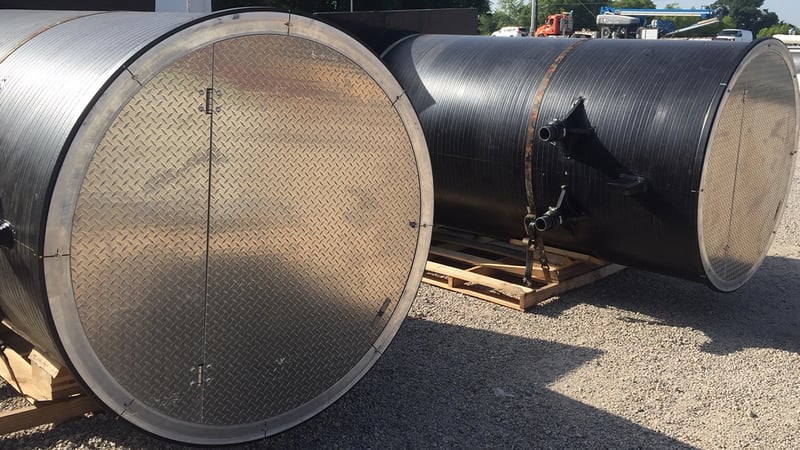 Twin Pump & Lift Stations delivered to a landfill for leachate (Blackwater) processing. The devices are identical, but the functions totally different
Twin Pump & Lift Stations delivered to a landfill for leachate (Blackwater) processing. The devices are identical, but the functions totally different
So, "A lift station is specifically designed for the pumping of waste or sewage material to a higher elevation versus the pump station, which is designed to raise water not sewage to a higher elevation.” So in general a pump station will be more municipal, why? Because they’re the people who are pumping around all the drinkable water. A lift station will be typically for wastewater treatment, which increasingly is done, as I was saying, by the end user.
So in this case, the device is exactly the same. Pump stations and lift stations are identical devices, but it's what runs through them that names them differently. We have an opportunity. There are several million pump stations and lift stations in America and they all crumble, so, we have a price advantage and we have a install time advantage.
Advantage Of Standardized
Why is it cheaper? Why is it less? Why is it faster to install? It is because we have standardized the design. Daniel Early's product line is highly standardized, so all those engineering costs go away. It's like when I went to Sam's club. I went and got an item and I didn't have to pay for the services of designing it. I just bought the box. That's what this is about. Sell them like pancakes.
Contingent Liability
Ken Berenger just piped up to tell me something very important. There is something called contingent liability. Let's say, I buy something that lasts me a year. I buy a cheap device. I go, “Fine, I’ll just need it for a year.” But, I buy that same thing five times in five years, so even though I saved money on it initially, it is costing me more money, plus when it breaks down, it's a hassle. And plus, I've got probably inferior performance as well.
Rather than go for that, you basically save a huge amount of money, and we calculate it’s $400,000 for every $100,000 spent. So if you spend $100,000 on a concrete system that will die in 20 years versus the same amount of money spent on a system that will last 100 years, we think far more, but let's call it a 100 years, then your lifecycle cost is dramatically lower. Here's the thing. Who's going to care about lifecycle cost? Ok, they care, but also the price is lower and they save on the install time so it's a win-win. That is why we are starting to just kill it on these proposals.
So that is really good news on the pump station/lifting station business. We're going to make it happen because we are going to do another killer video. Our videographer who happens to be my brother Stephen, is a feature film director and editor, but he also does our videos. And he's going to go out and interview municipalities and companies that are dealing with these. We are talking to companies or municipalities that are installing fiberglass systems that are literally falling apart as they're being installed.
So, we can get these people to speak up about this problem. Obviously, people have to finally replace their pump stations and lift stations, why? Because they end up, after a while, leaking so much that literally you just have no more water pressure, so you have to do something about it.
Changing Where, Not How
So it's more of this water treatment at the edge. Ken really put it a great way this morning, “The only thing we have changed is where water is treated, not how. Picture this, just adding millions of tiny micro utility locations at the point of use, all like leaves at the end of the central infrastructure tree. All these “leaves,” are bought privately by business. It doesn't have anything to do with the central system, except it dramatically alleviates the current overburdening by shifting capacity to the edges. $1 trillion added in the next five years, for instance, just adding leaves to the tree.”
No one can know yet if it's a trillion dollars over five years, that's just a concept. Frankly, it was hard to tell where the electric car revolution was going until it happened. Any time you have high disruption it is very, very hard to predict what will happen. What's great about growth at the edges, is that it happens in small increments.
I can't tell you what a hassle it is to work with a team that is pursuing a huge, vast deal. We've got one going right now and it's huge and vast. We tend to get those. Progressive Water Treatment gets those. It is part of Marc Steven’s business and Mike Jenkins his VP of sales is very good at it. But to live through the process of getting these big deals. It's like, the snake trying to swallow the pig. It's just this huge lump. Much more digestible is a lot of small deals with businesses. That is where we have this fantastic trend. So again, reinforcing the trend.
Investing In Service
Let's take a worst case scenario, all the capital, even capital for small stuff at the edge, just everything evaporates. I don't think so, why? Because it's an existing trend that will be reenforced, but let's say it is not. This is why we are heavily investing in service. For example, people are not going to go to restaurants. Well, they’ve still got to eat, so they're going to order in. So, one trend loses and another trend gains.
The Non-Obvious Things
Right now smart people are looking all over the stock market for the non-obvious things. What are the non-obvious things to do and to invest in those. This is what's happening right now. So in water, let's say, big capital equipment buys go away and all the big players freak out and move to the small units. Regardless, the water is still going to flow.
Replace Or Refurbish
When you have a dialysis machine that uses a membrane system and it has to operate at 99.8% purity, maybe higher, 99.9%. Or in the case of chip fabrication you're talking about a 100% clean water. They are not going to stop operating. People have kidneys, they are still going to have dialysis. They’ve still got to do that. It still has to happen. Bodies have to keep running and so they're going to replace their membranes. But whereas before they were just replacing it brand new, now they'll replace it with refurbished.
They'll take that membrane, send it in to be cleaned and get it back, if the membrane cleaning company has the ability to deliver the same standards. This is what we think is an amazing opportunity and we are working closely with a company that is a close partner of ours and they already send us a huge amount of business and we buy from them as well. They are in the membrane cleaning business and they're seeing exactly what I'm talking about. They're seeing companies that normally would just buy new are going, “Well, because you have such high quality we can actually use you.”
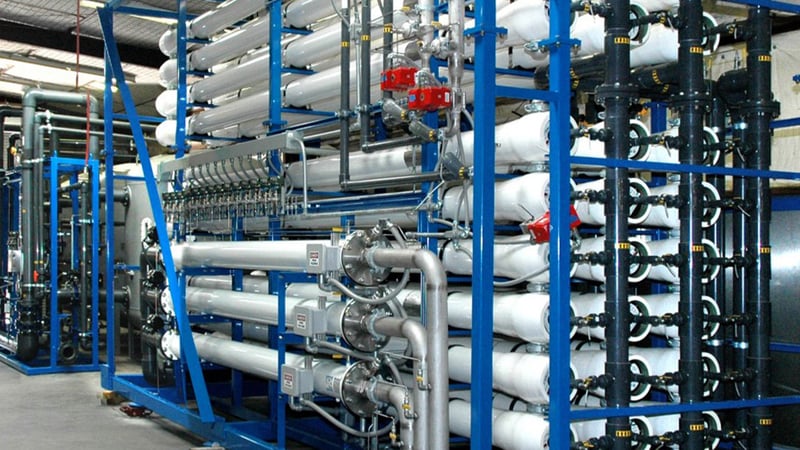 Reverse Osmosis ultrafiltration systems rely heavily on advanced membrane assemblies requiring regularly scheduled membrane cleaning or replacement
Reverse Osmosis ultrafiltration systems rely heavily on advanced membrane assemblies requiring regularly scheduled membrane cleaning or replacement
I’ll just talk a little bit about the process, because last week Bill Charneski and I visited and we learned it in great depth. When a membrane comes in for cleaning normally companies test them afterwards. Well he tests both before and after.
Then when the big companies test afterwards, they test three at a time and just use software to get the average. He tests every single one coming out, so its actual purity and the actual performance of that membrane are guaranteed, because each was individually measured. They have a whole sequence of things, which means that he has got the quality and he's not a high-priced operator. He is very efficient, does a great job economically. In other words, his pricing is fantastic. He can sell to our Texas company for resale, so Progressive Water can buy from him, resell the membranes, and it is cheaper than Progressive Water doing it itself, and the quality is better.
Developing Entry Strategy
Now membrane cleaning is a part of the water service sector. It is probably the easiest part because it's the most universal, a membrane is a membrane. Now there are much more specialized parts of the service industry, which is called general field service and that's an area of amazing opportunity, but it's an expert activity, and it's not something you want to step into lightly. In fact, we don't even want to invent membrane cleaning.
So, we are working on a strategy to enter this space in partnership with this operator. Nothing has been announced, I am telling you this as a potential situation, not as anything that is a done deal. But, we are very, very focused on getting into the service space with what you might call the low-hanging fruit because that is a trend that's going to take off. Because why? It is already happening, and things like coronavirus are going to make them happen even more. That's the logic of it.
Report From Spain
Let's take, for example, pig manure treatment. China just shut down. China already had a big problem with swine flu. Half of their pigs are being slaughtered, and so they're starting to import lots and lots and lots of pork. We were, in October, in Spain and sure enough they are on a roll. They are building pig farms, they're really factories, as fast as they possibly can. They have to be located at least one kilometer from each other, and so literally they are just making little dots all over the countryside, one kilometer radius, and there's just pig farms everywhere. We just had a report from our partner, Eduardo, the Director and one of the founders of Depuporc and he says, "We're receiving a lot of customer requests and planning visits to the pilot plant. We expect a 'tsunami' in the second quarter of 2020." Grain of salt. We're not predicting a tsunami. Eduardo's saying it, and again it might not happen, but what they’re saying is, "If I can meet them, I can get them." Well, they're meeting them. A lot of customers are showing up and planning visits to the pilot plant.
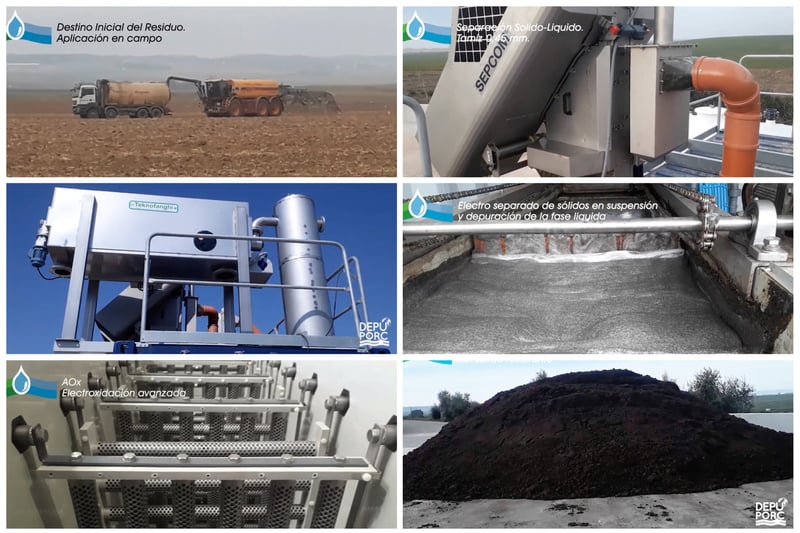 The Depuporc pilot plant uses OriginClear’s powerful Electro Water Separation™ and Advanced Oxidation™ technologies to convert swine manure to environmentally compatible fertilizers and irrigation grade water with regulation violating ammonia and other harmful microtoxins fully removed
The Depuporc pilot plant uses OriginClear’s powerful Electro Water Separation™ and Advanced Oxidation™ technologies to convert swine manure to environmentally compatible fertilizers and irrigation grade water with regulation violating ammonia and other harmful microtoxins fully removed
Also receiving recognition for local business organization such as the European Center for Innovation Enterprises, and in fact they're planning to put their headquarters there, which is cool. He says, "It's crazy. Once we have demonstrated the results of the system, everything has exploded in the positive way." I think that's him writing basically that, once people see how it operates, it's a no brainer. Why?
Because it's a zero-waste system. The manure flows into the system and out of it come two things. On the one side, this beautiful rich brown fertilizer, lovely stuff that is so rich and organic, right? It's not a chemical in any way. It's potentially organic if you feed the pigs that way. But even if it's not organic, it is certainly natural. And then on the other side is the purified water, which is generally purified only to the point where the ammonia is removed from it, but it still has nutrients which will be very good for the ground.
So the ammonia is taken out, and toxins and so forth. And it's almost clean, but it still has nutrients which are valuable. These are two valuable products that come out of what has been a toxic problem. Not only is this happening in Europe, but now we are starting to make it happen in the US. We have a partner in Wisconsin that is very excited about taking this to market and has got close relationships with dairy farms up there. Again, nothing guaranteed, but a lot of action. Again, you have to think about, well what's the big deal about a pig manure effluent treatment? Well, China is in trouble, and when China's in trouble, then they become dependent. So, what's already happening, which was that pigs were literally being killed because they had virus infections in China.
Aggravating The Trend
This will now be aggravated by the whole economic problem and the problem that China has with operating, and this will lead to a boom for our Spanish partners. I think that is, for me, a really good way to look at what is going to happen in the next few months. Now, I want to clarify everything that I have learned about coronavirus is it's a bad flu. Literally, I was reading an article that said, New York Times I think it was, that said coronavirus is not a bad disease, and that's good and bad. The article was saying, "Well it is bad because if it was really bad then people would shut things down."
I think the other way of looking at it is, it’s not a terrible thing. Getting hit with the coronavirus is going to be like a flu. So that's not what I'm talking about, and I don't think you should worry too much about the disease itself, but it is definitely going to take existing trends and reinforce them. For us in the water industry, it's about increasing the trend towards treatment at the edge, less central, more edge. And then it's also about an increase in service because of a lack of spending money on the systems that have to be built. They have to be built, but they're not, and people are stretching their system lives, and also they are somehow surviving right at the point of use.
So that's the way we look at it right now. We find this a very exciting time for us. Great fortunes are made in recessions, and that's because a recession has a lot of losers, but it also has perhaps a few winners, and if you can pick them, then you have a win. The problem is Zoom has already popped up as a stock, right? Gold is already up. All these, all the standard ones, it's already baked in. But I think that people are only now just realizing some of the things that can happen in other spaces. And this is why we’re so excited about what's happening in water.
OriginClear’s Offerings
What's great about the offering that we're both doing right now for our accredited investors and also coming soon for our unaccredited investors, and remember this is not a pitch for the unaccredited thing because we've just done a filing and it's not approved yet, but they are very similar in the sense that they are not about paying for stock.
They are about essentially becoming a lender to OriginClear, which is based on, in the case of the accredited investment portfolio, it is secured by our operating units in Texas, and it has a interest return and then a stock bonus. You are a very well-compensated lender to OriginClear. We think that's a very conservative way to go. Again, it's where things were going even before what is going on right now. I was hearing that, for example, if you wanted to sell an offering abroad, it had to be backed by hard assets, had to be secured in some way. Well that is simply going to continue to increase.
Again, what's an accredited investor? It means you're individually making $200,000 a year or jointly $300,000, for the last two years with the expectation it's going to continue, or you have a net worth of $1 million excluding your home. So, if you're not that, then this new unaccredited offering is going to be very interesting and it will enable people to put in as little as $500 and benefit tremendously with something that is very conservative.
Well that's it for today. It's been a great pleasure talking again. We're now getting ready for the first Thursday of every month. We were doing a video webinar kind of hectically the whole time before, and we're not doing that anymore. What we are doing here is, once a month do it right, produce it. Our permanent guest will be the inimitable Tom Marchesello, who's just a rock star. People love him because he is Mr. Reality. He's just fantastic. So, join me next week and it will be nicely produced. Same time, et cetera, first Thursday of every month. Meanwhile, it's been a pleasure having you on board. Thank you for joining, and I wish you a very good weekend. Good night.
Register for next week’s LIVE Water Is The New Gold Monthly Webinar: HERE
Important Disclaimer
The securities referred to in this presentation may be sold only to accredited investors, which for natural persons, are investors who meet certain minimum annual income or net worth thresholds. These securities are being offered in reliance on an exemption from the registration requirements of the Securities Act and are not required to comply with specific disclosure requirements that apply to registration under the Securities Act. The Securities and Exchange Commission has not passed on the merits of or given its approval to the securities, the terms of the offering, or the accuracy or completeness of any offering materials. The securities are subject to legal restrictions on transfer and resale and investors should not assume that they will be able to resell their securities. Investing in securities involves risk, and investors should be able to bear the loss of their investment.
%20250px.png?width=250&height=53&name=OriginClear%20Logo%202019%20(RGB)%20250px.png)



